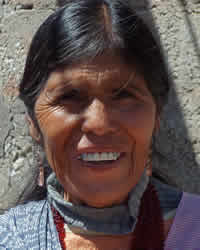Mazahua, Michoacan in Mexico

Photo Source:
Lon&Queta - Flickr
Creative Commons
|
Send Joshua Project a map of this people group.
|
| People Name: | Mazahua, Michoacan |
| Country: | Mexico |
| 10/40 Window: | No |
| Population: | 35,000 |
| World Population: | 35,000 |
| Primary Language: | Mazahua, Michoacan |
| Primary Religion: | Christianity |
| Christian Adherents: | 94.00 % |
| Evangelicals: | 2.50 % |
| Scripture: | Portions |
| Ministry Resources: | No |
| Jesus Film: | No |
| Audio Recordings: | Yes |
| People Cluster: | Otomi |
| Affinity Bloc: | Latin-Caribbean Americans |
| Progress Level: |
|
Introduction / History
The Mazahuas mainly live in the northwestern part of the State of Mexico and small parts of Michoacán and Querétaro. Commonly, they go to nearby Mexico City for work or Guadalajara. In the state of Mexico, they are usually found in the municipalities of San Felipe del Progreso and San José del Rincón.
There are different Mazahua dialects, one of which is Michoacan Mazahua. Their language comes from the Nahuatl word for "deer-foot,” referring to their tradition of hunting deer. Their language and culture are similar to those of the nearby Otomis.
What Are Their Lives Like?
Possibly due to their proximity to Mexico City, the Michoacan Mazahua culture is often overlooked. Their culture still exists; Mazahua women have their own unique clothes. A Mazahua groom gives his wife-to-be an erring made from a coin instead of a wedding ring.
Work and sex roles are traditional, and they have nuclear families. Everyone is expected to help with some community tasks throughout a given year.
Their cuisine is common for their part of central Mexico. Typical ingredients include squash, pipian sauce, quelite, and mushrooms found in the forests. They eat turkey in mole sauce during important feasts such as weddings and saints' days. They brew sprouted corn to make zende. After coloring it with chili pepper, they add pulque to start a fermentation process. It is ready to drink in four days, and it has a sweet and sour taste.
Since farming doesn't sustain them economically, most migrate to cities such as Mexico City, Veracruz, and Toluca for part of the year. Men usually work in construction while their wives work as domestic servants. Both genders sell goods in the markets or own small shops. Their goods include handcrafted items such as blankets, rugs, cushions, tablecloths, and carrying bags.
What Are Their Beliefs?
In general, the Michoacan Mazahuas are Roman Catholic, but they have blended this form of Christianity with indigenous beliefs. Their faith is partially in Christ, but also in indigenous gods. For example, every March 19, they have the New Fire ceremony where they bless fire. They stand in a circle, pointing to each cardinal direction, each honoring a particular deity. Inside the circle, they bless some wood and light it on fire. They use the fire to light candles. In the middle of August, the Michoacan Mazahuas go to rivers and lakes and perform a ceremony to thank water for its help with their agricultural needs. They also ask for water's forgiveness for abusing it through waste and pollution.
What Are Their Needs?
Michoacan Mazahua children seldom go beyond a primary education. This hampers their economic development.
Prayer Points
Pray for adequate schools and medical facilities for the Michoacan Mazahuas.
Pray for Holy Spirit fire to move in their homes and churches, drawing them to put all their faith in Jesus Christ.
Pray for the Lord to show his goodness and power by giving them an abundant harvest.
Pray for the Lord to move through Michoacan Mazahua men to love their wives and refrain from the excessive use of alcohol.